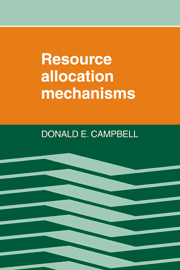Book contents
- Frontmatter
- Contents
- Preface
- Chapter 1 Introduction
- Chapter 2 Performance criteria
- Chapter 3 The Arrow–Debreu world
- Chapter 4 Uncertainty
- Chapter 5 Incentive compatibility
- Chapter 6 Existence of a competitive equilibrium
- Chapter 7 Welfare properties of the Walrasian mechanism
- Appendix 1 Elements of consumer choice
- Appendix 2 The Edgeworth exchange economy
- Appendix 3 Proof of the Shafer–Sonnenschein theorem
- References
- Author index
- Subject index
Chapter 7 - Welfare properties of the Walrasian mechanism
Published online by Cambridge University Press: 05 June 2012
- Frontmatter
- Contents
- Preface
- Chapter 1 Introduction
- Chapter 2 Performance criteria
- Chapter 3 The Arrow–Debreu world
- Chapter 4 Uncertainty
- Chapter 5 Incentive compatibility
- Chapter 6 Existence of a competitive equilibrium
- Chapter 7 Welfare properties of the Walrasian mechanism
- Appendix 1 Elements of consumer choice
- Appendix 2 The Edgeworth exchange economy
- Appendix 3 Proof of the Shafer–Sonnenschein theorem
- References
- Author index
- Subject index
Summary
This chapter briefly summarizes the welfare implications of Walrasian competitive equilibrium. It complements Chapter 3 by highlighting the particular economic assumptions that render the welfare theorems nonvacuous. (A theorem is vacuous if the conditions of its hypothesis cannot be met. For example, if we prove that an equilibrium is Pareto optimal, we have to show that an equilibrium exists for the result to be nonvacuous.) To simplify the exposition, attention will be confined to pure exchange private goods economies. An allocation x specifies a bundle xi of private goods for each household i = 1, 2, …, n. As usual, p denotes a price vector and wi is i's endowment vector.
We begin by recalling some basic definitions. A utility function ui for individual i is self-regarding if it is independent of the consumption of other individuals. It is implicit throughout this chapter that utility functions are self-regarding and that markets are complete: Every good that affects someone's utility is traded in some market. An allocation is Pareto optimal if it is feasible and there is no feasible allocation that would make everyone better off. A feasible allocation is strongly Pareto optimal if there is no other feasible allocation that would make at least one person better off and leave no one worse off. It will usually be implicit that conditions are such that the two definitions are equivalent.
Information
- Type
- Chapter
- Information
- Resource Allocation Mechanisms , pp. 147 - 155Publisher: Cambridge University PressPrint publication year: 1987
